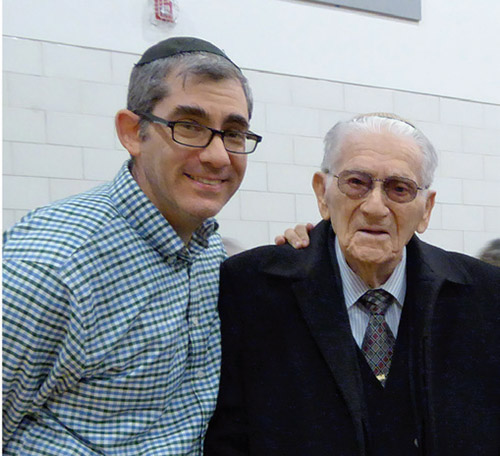

Family came first with Grandpa and I believe it came from his parents, Yaakov and Miriam, H”YD. Whenever he spoke about his parents, it wasn’t just “my father, my mother”—it was my “dear father/dear mother.” He spoke of his parents with such reverence and awe—I could not help but notice that the commandment to revere parents appeared in the weekly Torah portion in the week he passed.
Though he last saw his dear parents at age 20, they always loomed large. Grandpa spoke often about how he loved hearing his dear father sing z’miros and daven and what a great “balebuste” his dear mother was.
I cannot remotely fathom what Motzei Yom Kippur was like in 1942. When Grandpa would retell it, I could see him visualizing the scene when he last saw his family playing out in from of him—first, listening to his father’s beautiful voice go through the Yom Kippur davening. Immediately after they learned of imminent action. Next, his mother’s encouraging words, which stayed with him throughout the war and beyond—“You must put up a fight and not give up so easy. Run! Run children, run! Run into the forests and that way you shall survive!”
And fight he did. He often told me where he took his grievances—the first time, he said, was to God himself.
On a cold, windy day sometime in 1943, when my grandfather was working alone in a Polish farmer’s field, he told me that he screamed out to God in anguish when no person would hear him: “Ayeka”—“Where are You?” This one-word—“ayeka”—is a loaded term and he knew it. He had learned with his dear father the story of Adam in the Garden of Eden. Immediately after the whole tree fiasco, Earth’s first couple hid from God. God, of course, knew exactly where they were, but initiated a dialog. “Ayeka”—“Where are you?” “Where are you” not in the physical sense but rather, “Look where you are now compared to where you were—what you’ve done is beneath you. Ayeka!”
Grandpa, then a young man with no family and an uncertain future, felt compelled to vent to God himself. Where was He!?!
Over time, I believe, Grandpa found his answer. In 2007, Grandpa stayed with us for Simchas Torah. Amidst the good-natured organized chaos, I saw Grandpa standing in the back of the shul just taking in the scene—looking around at hundreds of Jewish children and their parents, some grandparents and even some other great-grandparents celebrate.
I asked, “Is everything okay, Grandpa?” What he said next always stuck with me.
“They didn’t win, Tatele. They didn’t win.” He said that in an understated way. But wow—how profound!
What was far from clear in 1943 became clearer to him in the decades that followed. God was always there, and while things looked very bleak, they didn’t win. When a grandfather who has seen a large part of the arc of Jewish history play out—literally—before his eyes, can look around in a packed shul and softly declare victory to his grandson, that’s the answer to “Ayeka.” Grandpa was a living testament that defied the odds. By making a series of choices based on his mother’s plea to never give up, to move on, to build a family with my dear grandma, he was absolutely right—they didn’t win.
His simplest pleasure was coming to our birthday parties and family simchas.
Grandpa worked hard as a painter and was meticulous. His reputation for that got him hired for some high-stakes jobs at landmark buildings in New York City. We learned firsthand what it meant to do a thorough job when he spent a summer with us overseeing some do-it-yourself home maintenance. Though we may not have fully appreciated it at the time, he showed us what it meant to have a good work ethic in seeing things through to the end.
I loved how he and Grandma would each make their own signature sugar cookies. Each cookie was kinda like their personalities. Grandma’s would melt in your mouth, was perfectly round and had a goldish color—an all-around pleasing cookie from the get-go. Grandpa’s cookies had a rough texture, weird color and did not immediately melt in your mouth—but boy did it taste good. You can’t judge a cookie,or a person, by its exterior. Both can be a little rough around the edges at times, but there’s so much to be savored.
He was feisty until the end. Grandpa didn’t mince words; he told people what he honestly thought. Like his cookie, it may have taken some getting used to, you may not have appreciated it from the get-go, but the pure honesty was refreshing.
A little perspective on our current situation. My other grandfather, Jack Wimmer, z”l, also a survivor, told me that what my Grandapa Sam Schloss went through was much worse. In the camps, they at least had each other. For over two years, Grandpa roamed the Polish countryside alone—isolated—not knowing where his next meal was coming from, whether he would find a safe place to sleep, like someone’s barn, whether an old classmate might see him and turn him in and other perils that would make most people lose the will to persevere. Grandpa lived through all that, came out stronger and went on to live a healthy, productive life.
While we’re all isolated in our homes, be thankful for the simple pleasures like a warm bed, hot food and, of course, family. All of us can make the best of it. I know Grandpa would want us to do that.
Grandpa, I hope and pray that when you look out from the heights above that we will all give you much nachas.
T’hei nishmaso tz’rura b’tzror hachaim.
By Jonathan Schloss
�










